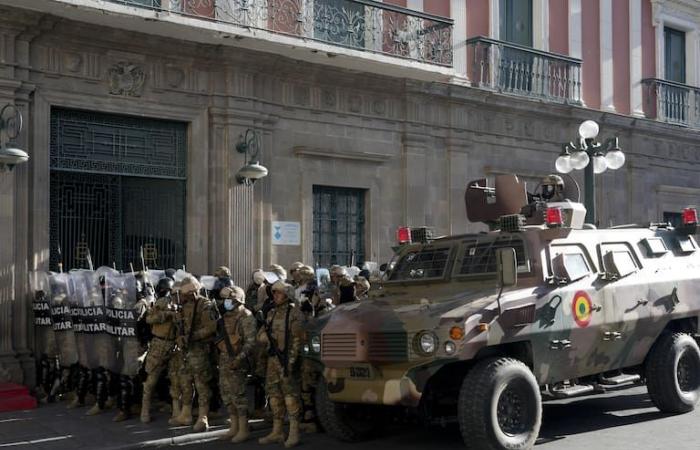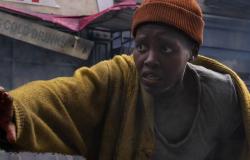Hear
LA PAZ.- Calm returned to the streets of La Paz on Thursday hours after the military uprising against President Luis Arcewhich plunged the country into uncertainty and political chaos. Traffic was normal on the streets of the Bolivian capital, supermarkets were preparing to open their doors and queues had dissipated at fuel stations. Supporters of the president kept vigil at the doors of the police station where General Juan José Zúñiga, leader of the military uprising that took place, is being held. It failed as it did not find an echo in other military units.
But In the streets doubt still seemed to float about what happened on Wednesday afternoon when, commanding tanks and armed soldiers Zúñiga, the dismissed general commander of the Armed Forces stormed the presidential palace in La Paz. Was it a failed coup as the government claims or a self-coup as other political sectors claim? Did Zúñiga act alone or did he have the support of other military sectors? Was he part of a new chapter in the power struggle between Arce and former president Evo Morales?
Before being arrested by the police at the doors of the main barracks of the Armed Forces in La Paz, Zúñiga told the media that President Arce himself had asked her to “do something” to raise the popularity of the president affected by an economic crisis, strong disputes within the ruling party and a growing climate of social unrest.
Several ministers of President Arce, including María Nela Prado, Minister of the Presidency and Arce’s right arm, rejected Zúñiga’s versions of an alleged self-coup“They were trying to decapitate the government and attack the president,” said the minister at the end of the hectic day on Wednesday.
One day before the revolt, Arce had decided to remove Zúñiga from the Army, which precipitated the soldier’s rebellion. “It all originates from the decision to change Zúñiga. The objective was to deal a blow to the government,” said the Minister of the Presidency, María Nela Prada.
“Today has certainly been an atypical day in the life of a country that wants democracy,” Arce said yesterday. referred to “an attempted coup d’état by the military that they are staining the uniform, that they are attacking our Constitution.”
“We deplore the attitudes of bad soldiers who unfortunately repeat history by trying to carry out a coup d’état when the Bolivian people have always been democratic people,” he stressed. Shortly afterward he came out to greet from the government palace surrounded by his ministers and thanked a crowd of Bolivians who came to the square.
Later, the police arrested Zúñiga based on a warrant from the Attorney General’s Office. The Vice Minister of Internal Affairs, Jhonny Aguilera, informed journalists before the arrest that the military man “has led a criminal uprising that has put the country in suspense. The Public Ministry has already ordered an investigation,” and mentioned that he is accused of several crimes that he did not detail.
Before being detained and in a brief dialogue with journalists, Zúñiga said that Arce had asked him to mobilize the soldiers to raise his image.
“The president told me: the situation is ‘very critical, it is necessary to prepare something to raise my popularity.’” Given this, Zúñiga would have asked Arce: “Shall we take out the armored vehicles?”, and the president, according to the soldier, responded: “Take out.”
Prada said that the version of a “self-coup is absolutely false” and that investigations are ongoing to to determine “other authors of this failed coup”. At a press conference, he read Zúñiga’s statement to the police after his arrest. In those statements, the rebel soldier says – according to Prada – that the “armed uprising failed because the military units took too long to arrive.”
The Government Minister blamed Zúñiga for a politically motivated coup attempt.
“We have two arrested. What was the goal of this group? The objective was to overthrow the democratically elected authority,” he indicated in a public message where he presented the two detainees, including the military command. “There were political motivations; General Zúñiga wanted to take command,” said Del Castillo.
Edmundo Novillo, Minister of Defense, appeared shortly after surrounded by the new military commanders to ensure that “everything is now under control” and that the “coup attempt has been put down; “It was a failed coup.” He called on citizens to return to normality.
He added that “the barracks are returning to normal.”
Doubts about the seriousness of the military movement began to arise after the arrest of General Zúñiga. The same soldier revealed shortly before being taken to a police cell that the military movement was agreed upon with the ruler Arce last Sunday, because – he said – he proposed to him “to prepare something to raise his popularity” in the middle of a situation ” fucked” in the country, without giving more details.
For sectors of the Bolivian opposition, including some aligned with Evo Morales, it was actually a “self-coup,” as the military man himself claimed.
“This has been a setuphe [Zúñiga] He fulfilled the script that he was told to write, it has already begun to be dismantled. There was a lot of disbelief, they wanted to give him a greater narrative with the live arrest and he says that he has only done “what they told him to do, said Carlos Romero, former Minister of Government of former President Evo Morales to the television station Red Uno.
“It is surprising that despite the movement of a strong military contingent at kilometer zero [como se conoce a la plaza Murillo de La Paz, frente a la que están el Palacio de Gobierno y el Congreso] There has been no reaction from the police,” said Senator Luis Flores, of the Movement towards Socialism (MAS), to which Morales and Arce belong.
Hours before, Morales had denounced on the social network X that a coup d’état was brewing. Television images showed several armored military vehicles and a group of soldiers in front of the government headquarters, who later entered the palace after ramming the entrance.
The incident involving the uniformed men, which had not been repeated in more than 20 years of democratic life, It is registered in the midst of turbulence in the economydue to the shortage of dollars that is causing complaints in the import trade and fuels that is angering freight transport unions. In the background there is also the dispute between Arce and Evo, his political mentor, for the candidacy for the next general elections in 2025.for a period of five years.
Zúñiga joined the political fights, after expressing on Monday his firm opposition to the eventual return to power of Morales, who disputes with Arce the leadership of the ruling party. In an interview on Monday with a television station, he even assured that he would stop Morales if he insisted on running for president next year. For some analysts, The military uprising is part of this internal struggle.
Arce and Morales have been involved in an intense political fight for a couple of years. Protected by the constitutional reforms that he himself promoted, Morales held the presidency between 2006 and 2019, when he was forced to resign, harassed by the crisis that erupted due to alleged electoral fraud to obtain a fourth term.
At the end of last year, The Constitutional Court disqualified Morales from being a candidate againwhich the former president interpreted as a maneuver against him by his former Minister of Economy. The government wing of the Movement Towards Socialism (MAS) proclaimed Arce as its candidate for 2025. Another sector supported Morales’ aspiration, who has not yet given up on his aspiration despite the judges’ ruling.
Centrist former president Carlos Mesa (2003-2005) indicated on the X network that the military mobilization “It looks like a farce”. He recalled Zúñiga’s accusation of a pre-agreement with Arce and demanded an investigation to clarify everything that happened.
For their part, several analysts point out a series of “inconsistencies” in what happened. In particular, the passivity of President Arce stands out in the face of the insubordination of General Zúñiga, whom he himself had appointed this year and was considered one of his trusted men.
“Yesterday, the Arce government received a lot of international support, united the unions that support it and even won support from the opposition, but everything is dissipating and at this point the supposed military coup has lost support and credibility in the streets,” said political analyst Franklin Pareja. “Perhaps the government is seeking to toughen up to face the social situation that may become complicated”he noted.
The situation arises at a difficult time for the president, one year before the presidential elections. The economic crisis and the shortage of fuel and other goods have affected the popularity of Arce, who in turn lost governability in the Legislative Assembly after his party – the Movement towards Socialism (MAS) – was divided by fights with Evo.
“This seems to have been a self-coup. In my perception, it has been a self-coup”said Josefina de Macri, a 58-year-old independent worker.
“They are playing with the intelligence of the people, because Nobody believes it, no, not even a 20-year-old boy is going to believe this.“, he commented to the lawyer Evaristo Mamami for whom it was a “maneuver… because there is wear and tear on the government.”
According to one count, Bolivia has had more than 190 coup attempts and revolutions since its independence in 1825 in a repetitive cycle of conflict between the political elites of urban areas and rural sectors.
This is not even the first alleged coup attempt in recent years. In 2019, Morales, Bolivia’s first indigenous president, ran for a third term despite a constitutional ban. He won a disputed vote plagued by allegations of fraud, sparking mass protests that left 36 dead and led Morales to resign and flee the country.
Agencies AFP, AP and ANSA
THE NATION






